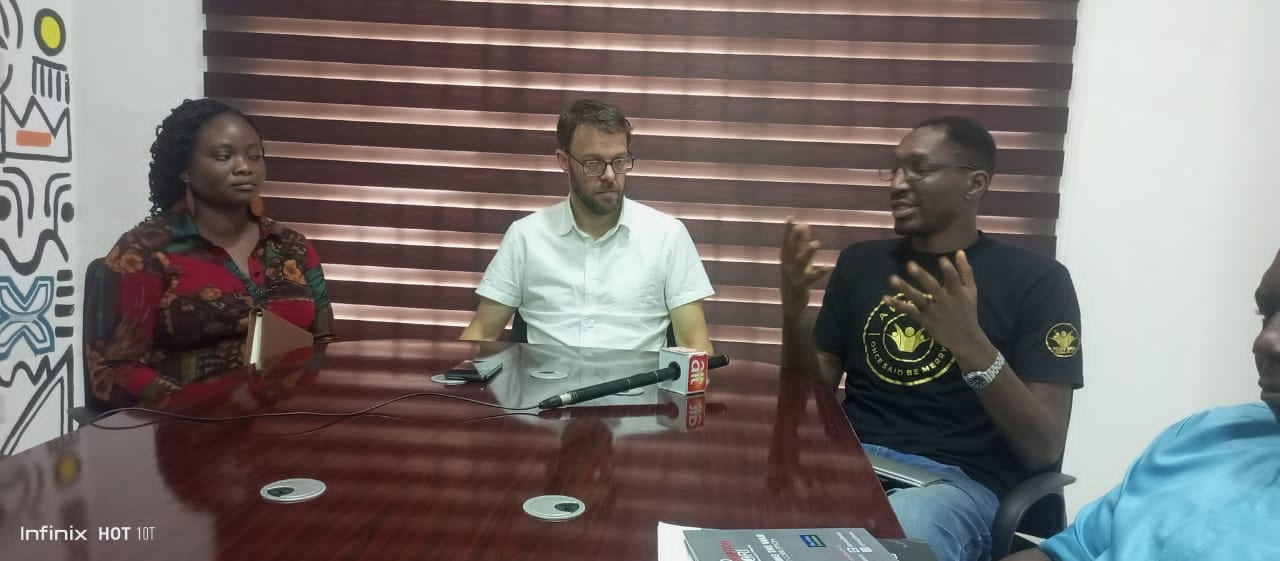
Accountability Lab has expressed dissatisfaction over the level at which corruption thrived under the immediate past administration led by Muhammadu Buhari.
Executive Director, Accountability Lab Global, Blair Glencorse, in a Media chat with journalists Friday in Abuja, said the anti-corruption war under Buhari regime floundered at every step – from investigation, prosecution to policy change.
According to Glencorse, former President Buhari began his tenure with significant power and potential and could have made more progress in building strong institutions but lost credibility he may have had to fight corruption in his second term.
He said the development was not a lack of understanding or awareness of the issues by civil society organizations, adding that organizations such as Yiaga Africa, Enough is Enough, Connected Development, Accountability Lab and others have consistently tried to alert the government on how political interference weakens independence of institutions but he paid deaf ears to all calls.
He said: “former President Buhari took office in May 2015 and was reelected for a second term in 2019, campaigning on anti-corruption, security and economic development. When he assumed office, based on his aggressive campaign for anti-corruption, government agencies and civil servants appeared to have a renewed sense of vigor. We even saw Nigerians posting pictures of frozen beer and drinks, attributing the short-lived power supply improvements to Buhari’s “integrity” body language.
“While there have been initiatives to fight corruption under Buhari’s administration, as a military ruler and subsequently a democratically elected president, it is essential to assess his legacy- both achievements and shortcomings.
“Corruption in Nigeria has been in the spotlight at all levels of governance for many years, with deep-rooted unethical practices plaguing the state for generations.
“Corruption is notoriously difficult to measure but even indices that measured Nigeria’s integrity demonstrated how far we fell short – the Index of Public Integrity for example, ranked Nigeria 102nd out of 114 countries.
“However, findings from the Chatham House, Africa Programme’s Social Norms and Accountable Governance Project showed that many Nigerians in many instances, eight out of 10- believe corruption was morally unacceptable. Most of us oppose corruption but it endures nonetheless.
“Buhari has called himself a “man of integrity” but how can a morally upright man preside over so much unwanted graft? In office, President Buhari indicated that political officeholders would face trial if convicted for corruption but the reality of politics was quickly made clear.
“Those that provided political support and votes were quickly brought into the fold- despite questions about their behaviors and morals. Other politically exposed persons (PEPs) have not been brought to account. For example, a former governor and serving senator, aspiring to be the Senate President of the 10th Assembly was initially sentenced by a Federal High Court to 12 years’ imprisonment for N7 billion in fraud but was later released through a Supreme Court judgment.
“An Independent Corrupt Practices and Other Related Offences Commission (ICPC) report alleged around N9.4 billion in bribes between 2018 and 2020 due to exorbitant amounts offered to judges for political cases. Buhari praised the late dictator, General Sani Abacha as a man who should be celebrated.
“Meanwhile, Abacha was listed as one of the most corrupt leaders in the world’s history and is estimated to have siphoned between $2 – $5 billion of Nigeria’s money. The Nigerian government is still repatriating the stolen funds.
“Issues related to procurement are a case in point. As identified by the ICPC, around 60 percent of corruption cases are procurement-related due to public servants abusing procurement processes.”
“According to corruption patterns and trends in Nigeria, the average bribe paid for a government contract or public procurement opportunity is N31,955. Before the 2015 elections, Buhari promised in a document entitled, “My Covenant with Nigerians,” that he would constitute the National Council on Public Procurement if elected, as provided for in the Public Procurement Act 2007.
“However, the government has continued to approve unaccountable sums of money through the Federal Executive Council, thereby usurping the powers of the NCPP. Government institutions have become a breeding ground for unethical practices and behaviours that have fundamentally undermined most Nigerians’ well-being, exacerbating poverty and entrenched inequity.
“Public officials, including the President, must act in the best interests of the people they serve. Accountability ensures that those in public life are transparent, honest, and responsible for their conduct and the impact of their policies.
“Part 1 of the fifth schedule in the Nigerian Constitution provides for a Code of Conduct for public officers, and section 8 of the Code of Conduct Bureau and Tribunal Act, Cap C15, Laws of the Federation of Nigeria 2004, states: a public officer shall, at the end of four years and the end of his term in office, submit to the Code of Conduct Bureau a written declaration of all his properties, assets, and liabilities and those of his unmarried children under the age of 18 years. But these provisions are rarely enforced.
“An instance is a request by Premium Times made to the Code of Conduct Bureau through the Freedom of Information (FOI) Act for Mr. Buhari’s assets declaration details. The bureau refused to release the document, which has exposed the gaps in the provision of paragraph 3(c) of the Third Schedule, Part 1 of the 1999 Constitution of the Federal Republic of Nigeria, as amended, that makes assets declarations of public officers available for inspection by any citizen of Nigeria, only on terms and conditions prescribed by the National Assembly (through the FOI).
“Holding public office in Nigeria today is not a privilege and an opportunity to serve our people as it should be; but an aspiration for those that hope to subvert the system to support their wealth creation.
“However, we have seen examples of exemplary public servants who have been outstanding, such as Dr. Yemi Kale, two-time Statistician-General of the National Bureau of Statistics, who was named and famed as an Integrity Icon for producing credible, reliable, consistent, and timely data on national issues and concerns.”
“In this kind of situation, civil society is essential. Civil Society Organizations (CSOs) have collaborated to support the ICPC in developing the National Ethics and Integrity Policy.
“This policy fosters a culture of integrity, transparency, and accountability in the public and private sectors. It also upgrades the non-functional Code of Conduct for public servants, designed to ensure public accountability by public officials.
“While Buhari praises himself for recovering “unaccounted trillions” of naira from corrupt officials, CSOs supported the passage and signing of unpopular bills in response to these, such as the Proceeds of Crime (Recovery and Management); the Money Laundering (Prevention and Prohibition), Whistleblower Policy; and the Terrorism (Prevention and Prohibition).
“When we are let down so dramatically by the so-called people of integrity in our society while simultaneously suffering from weak policies with lackluster implementation, citizens must step up to demonstrate and shape the behaviors we want to see.
“Nigeria’s number one citizen promised to lead but failed to fulfill his promises or public accountability commitments.
“Accountability is crucial not only for maintaining public trust but also for fostering a healthy democracy. As he leaves office, Buhari will be remembered not as a man of integrity but as a man of opacity.”






